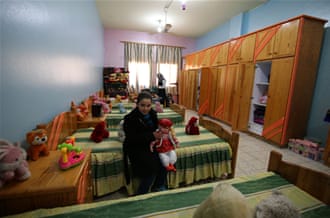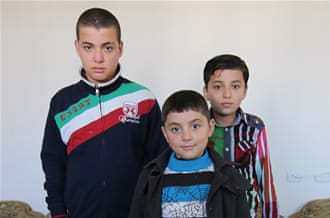The number of children living at the al-Amal Institute for Orphans has nearly doubled since the 2014 war.
 |
| 'Whenever I hear aeroplanes, I get scared,' says Aisha al-Shinbary, 8, pictured at centre [Hatem Omar/Al Jazeera] |
But the brightness is a facade: These children draw war. They sketch rockets and Israeli fighter jets, pictures of people shattering into pieces, because this is what they know.
"Whenever I hear aeroplanes, I get scared," eight-year-old Aisha al-Shinbary tells Al Jazeera, curling her legs underneath her on a cushion in one of Amal's common rooms.
 |
| Amal takes only the neediest children [Hatem Omar/Al Jazeera] |
Aisha arrived at Amal several years ago after her father died naturally and her brother was killed in an Israeli air strike. Her mother could no longer care for all the children.
During the 2014 war, the orphanage sent all its children to live with relatives while the facility was temporarily opened up as a shelter for hundreds of displaced Gazans. Aisha returned to live with her mother, but shortly afterwards, her mother, too, died in an Israeli air strike.
Today, Aisha's mother comes to her only in dreams. She kisses and hugs her little girl, and then she disappears. Aisha wakes up, orphanage administrators say, and she draws rockets.
Aisha's story is not unusual in the besieged Gaza Strip, where a 51-day Israeli assault killed more than 2,200 Palestinians this summer and injured scores more. The 2014 war created more than 1,500 new orphans, in addition to tens of thousands already living in Gaza, says Abed Almajed Alkhodary, chairman of Amal's board of directors.
 |
| 'They're always scared' [Hatem Omar/Al Jazeera] |
"Some orphans here watched their families and mothers die in front of them," Alkhodary tells Al Jazeera.
After the 2014 war, the number of orphans residing at Amal nearly doubled to 150, the highest number in the orphanage's history, board member Kamal Meqbin tells Al Jazeera - and that number is expected to rise further throughout the year. The centre, which is funded privately, is being renovated and expanded to accommodate the influx, while a staff of more than 50 works around the clock to monitor, feed, teach, play and comfort Amal's young residents.
"The psychological situation for a kid whose family was killed, who went to buy something and came home to find his family dead - this is the worst you can see," Meqbin said, noting many orphans struggle with deep-seated psychological issues and crippling anxiety.
"They don't sleep. They're always scared," Meqbin says. "We spend as much time as possible with them so they can cope."
Read More >>>

No comments:
Post a Comment